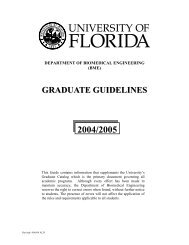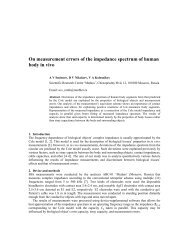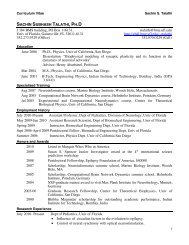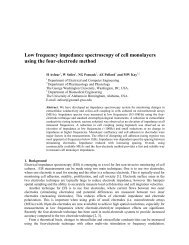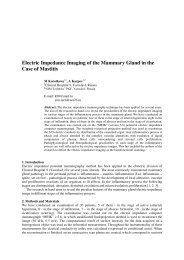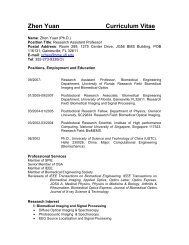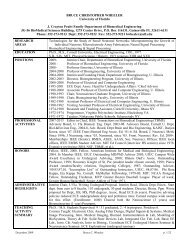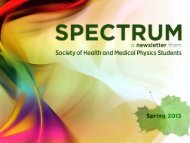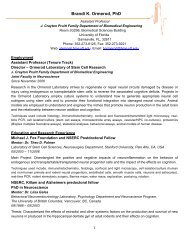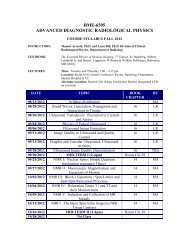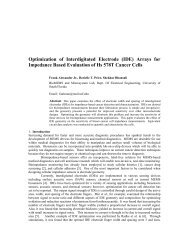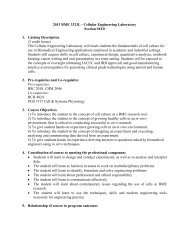Fall 2012 Syllabus - Biomedical Engineering - University of Florida
Fall 2012 Syllabus - Biomedical Engineering - University of Florida
Fall 2012 Syllabus - Biomedical Engineering - University of Florida
Create successful ePaper yourself
Turn your PDF publications into a flip-book with our unique Google optimized e-Paper software.
BME 5703 Statistical Methods for BME<br />
<strong>Fall</strong>, <strong>2012</strong><br />
Catalog Description: This course covers statistical methods needed for experimental biomedical<br />
engineering research. Students will be acquainted with a variety <strong>of</strong> techniques for analyzing and<br />
modeling data arising in molecular, cellular, physiological, and pathological systems<br />
encountered in typical laboratory and clinical settings.<br />
Credits: 03<br />
Prerequisites: Knowledge <strong>of</strong> calculus, linear algebra and basic statistics is required.<br />
Instructor: Pr<strong>of</strong>. Mingzhou Ding<br />
Office: Room J285 BMS Building<br />
Office Hours: Monday, Wednesday, Friday from 9 am to 10 am or by appointment<br />
Email: mding@bme.ufl.edu<br />
Class Meeting: Monday, Wednesday, Friday 9 th Period (4:05 pm to 4:55 pm)<br />
Required textbook: None.<br />
Recommended textbook: Probability and statistical inference by Hogg and Tanis (6 th edition).<br />
The analysis <strong>of</strong> time series: An introduction by Chatfield (6 th edition).<br />
Course Content:<br />
Part I: Random variables, probability distributions, and statistical inference<br />
Chapter 0: Introduction<br />
Chapter 1: Probability distributions<br />
Chapter 2: Estimation, confidence intervals and statistical hypothesis testing<br />
Chapter 3: Nonparametric methods<br />
Part II: Univariate time series analysis<br />
Chapter 4: Concepts <strong>of</strong> stochastic processes<br />
Chapter 5: Spectral analysis<br />
Part III: Special topics<br />
Chapter 6: Experimental design and ANOVA<br />
Chapter 7: Discriminant analysis and classification<br />
Chapter 8: Independent component analysis (ICA)<br />
Grade Determination:<br />
50% Homework<br />
25% Midterm Exam<br />
25% Final Exam<br />
Final grades will be curved.<br />
Undergraduate students, in order to graduate, must have an overall GPA and an upper-division<br />
GPA <strong>of</strong> 2.0 or better (C or better). Note: a C- average is equivalent to a GPA <strong>of</strong> 1.67, and<br />
therefore, it does not satisfy this graduation requirement. Graduate students, in order to graduate,<br />
F://Academic/BME Curriculum/Syllabi/<strong>Fall</strong> 2006/BME 6938 <strong>Biomedical</strong> Imaging
must have an overall GPA <strong>of</strong> 3.0 or better (B or better). Note: a B- average is equivalent to a<br />
GPA <strong>of</strong> 2.67, and therefore, it does not satisfy this graduation requirement. For more<br />
information on grades and grading policies, please visit:<br />
http://www.registrar.ufl.edu/catalog/policies/regulationgrades.html<br />
Policies:<br />
Late policy for homework: 20% deducted per day, unless prior arrangements were made with the<br />
instructor. Students are encouraged to work together on the homework, but the work that's<br />
handed in must be individual work.<br />
Academic Honesty:<br />
In adopting this Honor Code, the students <strong>of</strong> the <strong>University</strong> <strong>of</strong> <strong>Florida</strong> recognize that academic<br />
honesty and integrity are fundamental values <strong>of</strong> the <strong>University</strong> community. Students who enroll<br />
at the <strong>University</strong> commit to holding themselves and their peers to the high standard <strong>of</strong> honor<br />
required by the Honor Code. Any individual who becomes aware <strong>of</strong> a violation <strong>of</strong> the Honor<br />
Code is bound by honor to take corrective action. A student-run Honor Court and faculty support<br />
are crucial to the success <strong>of</strong> the Honor Code. The quality <strong>of</strong> a <strong>University</strong> <strong>of</strong> <strong>Florida</strong> education is<br />
dependent upon the community acceptance and enforcement <strong>of</strong> the Honor Code. We, the<br />
members <strong>of</strong> the <strong>University</strong> <strong>of</strong> <strong>Florida</strong> community, pledge to hold ourselves and our peers to the<br />
highest standards <strong>of</strong> honesty and integrity. On all work submitted for credit by students at the<br />
<strong>University</strong> <strong>of</strong> <strong>Florida</strong>, the following pledge is either required or implied: "On my honor, I have<br />
neither given nor received unauthorized aid in doing this assignment."<br />
Students with Disabilities:<br />
Students requesting classroom accommodation must first register with the Dean <strong>of</strong> Students<br />
Office. The Dean <strong>of</strong> Students Office will provide documentation to the student who must then<br />
provide this documentation to the Instructor when requesting accommodation.<br />
F://Academic/BME Curriculum/Syllabi/<strong>Fall</strong> 2006/BME 6938 <strong>Biomedical</strong> Imaging



